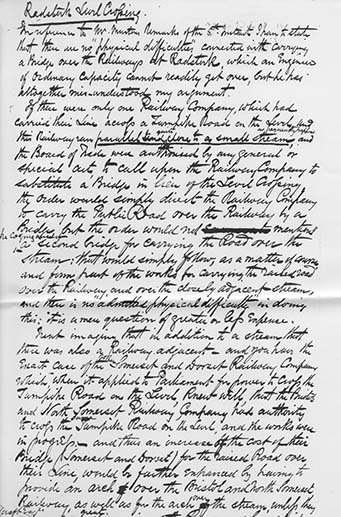Reply from Colonel Yolland (Board of Trade Inspector) to the Solicitor's Department of the Board of Trade
12th July 1877
Original Document - The National Archive, Kew. MT6 644/5

Radstock Level Crossing
In reference to Mr M… remarks of the 5th Instant I have to state that there are no “physical difficulties” connected with carrying a bridge over the railways at Radstock which an engineer of ordinary capacity cannot readily get over, but he has altogether misunderstood my argument.
If there were only one railway company, which had carried their lines across a turnpike road on the level and this railway ran parallel and quite close to a small stream as frequently happens and the Board of Trade were authorised by any general or special act to call upon the railway company to substitute a bridge in lieu of the level crossing, the order would simply direct the railway company to carry the public road over the railway by a bridge, but the order would not mention or take cognisance of a second bridge for carrying the road over the stream; that would simply follow as a matter of course and form part of the works for carrying the raised road over the railway and over the closely adjacent stream, and there is no “admitted physical difficulty” in doing this: it is a mere question of greater or less expense.
First imagine that in addition to a stream that there was also a railway adjacent – and you have the exact case of the Somerset and Dorset Railway Company which when it applied to Parliament for powers to cross the turnpike road on the level, knew well that the Bristol and North Somerset Railway Company had authority to cross the same turnpike road on the level and the works were in progress – and thus an increase of the cost of their bridge (Somerset and Dorset) for the raised road over their line, would be further enhanced by having to provide an arch over the Bristol and North Somerset Railway, as well as for the arch over the stream, unless they made some great diversion of the road and brought it down by a descent of 1 in 30 to the existing road between the lines of railway – I do not say that the Somerset and Dorset could not legally do so: neither do I say that such a mode of proceeding would not be very inconvenient to the public, but I do hold that if they determined to do this it is for them to find out the means of complying with the clauses which govern the inclinations of the approaches to bridges, and not for the Board of Trade to admit that there are any physical difficulties in carrying a public road over one or two lines of railway and a stream.
2. It must be recollected that both the Bristol and North Somerset and the Somerset and Dorset Railway Companies both in the first instance proposed to carry the turnpike road across the railway by bridges: - and when they subsequently, separately, and at different times applied for authority to cross it on the level, they were opposed by the road authorities and by reports from the Board of Trade. It seems to me therefore that the records of the proceedings (which are usually printed) which took place before the select committee which sanctioned these separate level crossings should be carefully looked through and the reasons which were assigned by the Counsels for the railway Companies that induced the Committees to grant these very objectionable level crossings ascertained. I was not present but I do know that the common argument which is brought forward to grant a level crossing in opposition to a report from an officer of the Board of Trade, is that if the level crossing is found to be dangerous or objectionable, it is always open for the Board of Trade to order a bridge: and in my opinion it should be ascertained whether this was done in either of these cases – so that it might be stated to the Court when the Mandamus is applied for.
3. The effect of the order for each company to build a bridge would be that the cost to each would be diminished to one half if they took the advice of the Board of Trade and each built one half of the bridge.
W Yolland 12th July 1877
To return to the History Page - Simply close this window